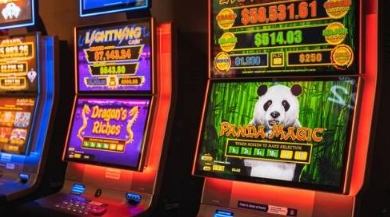Online slots are one of the most popular games in digital betting, attracting countless players with their simple gameplay and potentially high rewards. However, a common question for novice or skeptical players is: “Are online slots legal?” The answer is yes, online slots are credible in terms of legality and fairness, but only if you choose a regulated platform. This article will explore the legality of online slots, their operating mechanism, and how to ensure safe participation, to help you eliminate doubts and enjoy the game with peace of mind.

The legality of online slots
Online slots are a legitimate form of entertainment in their own right. Their legality depends on several key factors:
- Legal regulation
- In countries and regions where online gambling is permitted (e.g. Nigeria, the UK, Australia), slots are strictly regulated. For example, legal platforms are licensed by the National Lottery Regulatory Commission (NLRC) in Nigeria and overseen by the UK Gambling Commission (UKGC) in the UK.
- Platform compliance
- Legitimate online casinos (e.g. Bet365, 1xBet) hold licenses issued by an authority and must comply with standards of fairness, payments and data protection. These platforms offer online slots that have been certified as being free from illegal manipulation.
- Regional restrictions
- In some countries (e.g. mainland China), online gambling is completely banned, so playing online slots may be illegal. However, in regions where gambling is legal, it is a recognized form of entertainment.
Therefore, as long as you play online slots in a legal region via a regulated platform, it is legal and safe.
How online slots work
The legality of online slots is not only reflected in legal compliance, but also in their fair and transparent operating mechanism:
- Random number generator (RNG)
- Each online slot machine uses RNG technology to ensure that the outcome of each spin is completely random and cannot be manipulated by the platform or the player. The RNG is regularly tested by third-party organizations (such as eCOGRA and iTech Labs) to verify its fairness.
- Return to Player (RTP)
- RTP (Return to Player) is a publicly available metric that shows the proportion of funds returned to players over time. For example, a game with an RTP of 96% will return an average of $96 for every $100 wagered. This figure is set by the developer and subject to regulatory scrutiny.
- Independent audits
- Slots on legitimate platforms are subject to independent audits to ensure they meet fair standards. Players can check for relevant certifications on the website or in the game description.
Why do some people question their legitimacy?
Although online slots are legal, some players still doubt their authenticity, which may be due to the following reasons:
- Illegal platforms: Unregulated websites may refuse to pay bonuses, manipulate results or steal user information, damaging the reputation of the industry.
- Misunderstanding of losing money: With an RTP below 100%, playing for a long time will inevitably result in a net loss, which some players mistakenly believe to be “illegal” or “unfair”.
- Lack of transparency of information: Some small platforms do not disclose RNG certification or RTP, which leads to a lack of trust among players.
How can I ensure that an online slot machine is legitimate?
To ensure that the online slot machine you are playing is legitimate and reliable, please take the following measures:
- Choose a regulated platform
- Give priority to websites that hold a license from the NLRC, UKGC or the Malta Gaming Authority (MGA). These platforms are bound by law and dare not operate illegally.
- Verify the source of the game
- Choose games provided by well-known developers (such as NetEnt, Microgaming, Pragmatic Play), which are known for their fairness and high quality.
- Check RTP and certification
- Check the RTP (95% or higher is recommended) and third-party certification marks of the game. For example, Blood Suckers has a trusted RTP of 98%.
- Test the payment process
- Play a few rounds with a small amount of money (e.g. 100 naira), withdraw the winnings and try to withdraw the money again to verify whether the platform pays on time.
- Refer to user reviews
- Check the feedback from other players to understand the reputation and payment record of the platform.
Proof of authenticity of online slots
- Payment case: In 2015, a British player won £24,000,000 on Mega Moolah with 25 pence, and the prize was legally paid by Betway Casino.
- Nigerian experience: Local players have won prizes through platforms regulated by the NLRC and withdrawn to bank accounts, proving their reliability.
- Third-party certification: Regular reports published by eCOGRA and other organizations show that the RNG and RTP of legal slot machines meet fair standards.
Precautions
- Local laws: Confirm that online gambling is allowed in your region to avoid the risk of breaking the law.
- Rational expectations: With an RTP below 100%, losing is the norm and winning is down to luck.
- Avoid illegal websites: Don't use unlicensed or poorly rated platforms to avoid being cheated.
Conclusion
Online slots are a legitimate form of entertainment, and their fairness is guaranteed by the RNG, RTP and strict regulation. As long as you choose a regulated platform and understand the game mechanics, you can participate with confidence and enjoy a real chance of winning. From the steady returns of Starburst to the huge jackpots of Mega Moolah, online slots are both legal and fun. Next time you consider playing slots, find a trusted site, spin the reels and try your luck – there's no doubt about the legality, and winning is within reach!